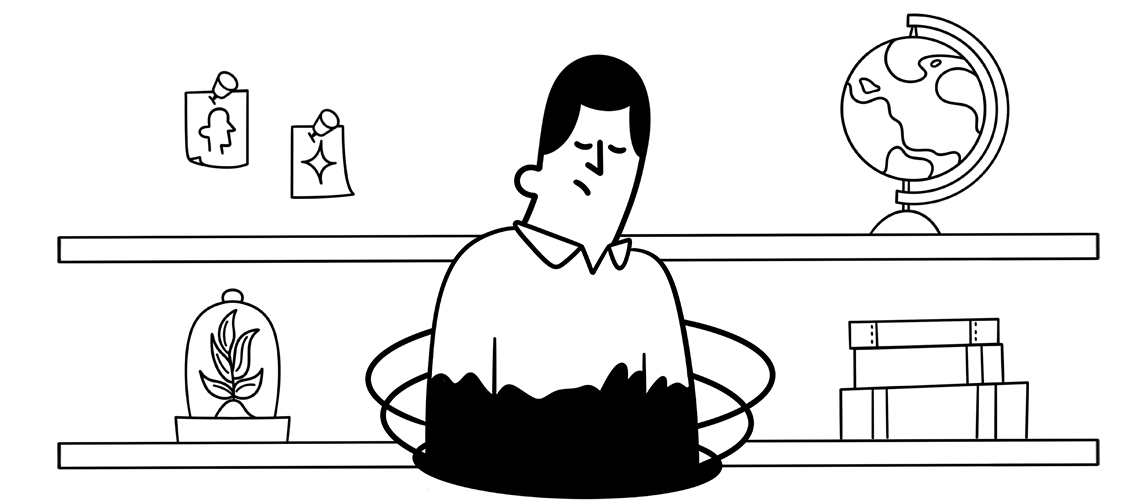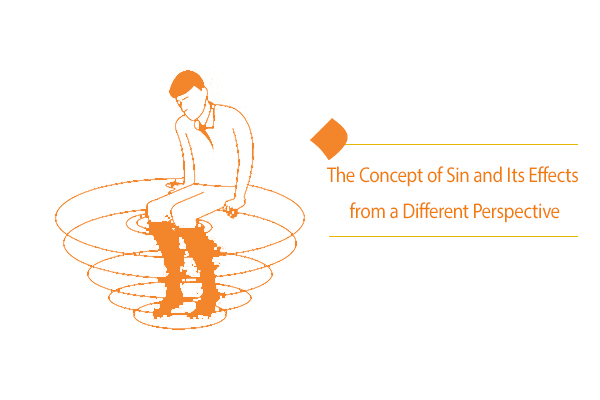What Is the Concept of Sin? How Does Sin Change Our Inward State?
One of the reasons for the ineffectiveness of cultural and educational initiatives in most countries is conveying religious concepts through incorrect methods to individuals. The partial societal aversion to religion in part of society, especially among young people, also stems from this issue. Many of us have a superficial and shallow understanding of religious teachings. This lack of depth often leads us to misinterpret or incompletely grasp these teachings. Anything misinterpreted or misunderstood does not make sense logically and is naturally unacceptable. We need to redefine religious teachings in many areas, one of which is related to the concept of sin.
The general public, due to their lack of familiarity with the mathematical structure of the universe and also because of the ideas instilled in their minds since childhood, understand sin merely as “opposition to God’s command.” They believe that sin means doing something that God does not like His followers to do, and He punishes anyone who goes against His command. This interpretation of the concept of sin is not wrong, but it is very incomplete. This incompleteness provides the basis for many misconceptions. It reduces God in the human mind to the level of an illogical and tyrannical ruler who commands without reason and forces others to obey. If we understand sin in the context of humanology and divine universology, as it truly is, we will automatically resolve many of these doubts. We will clearly see the reasons why we dislike or forbid sins.
Sin is the greatest obstacle on our path toward the hereafter. Someone who engages in good deeds without recognizing sin and abstaining from it is like a farmer who invests, hires laborers, prepares seeds, and uses all the efforts of cultivation and maintenance. However, this farmer fails to identify and eliminate pests in the field and continues farming contentedly. He is unaware that pests are lurking in the harvest and will ultimately destroy all his efforts.
In Islamic teachings, recognizing sins and abstaining from them is considered a prerequisite to recognizing good deeds and engaging in them [1]. Unfortunately, the lifestyle of most of us is completely contrary to this principle. Many of us fill our time with charitable acts and good deeds, paying no attention to sins that, like thieving mice, steal away the goodness of our actions. This is what leads us to be empty-handed and impoverished in the afterlife, at the time of reckoning when the harvest is due.
In this barn, we store our corn,
Yet lose the harvest we adorn.
Why, with minds so keen and wise,
Ignore the mouse that slyly lies?
With cunning stealth, it made a hole,
And through its guile, it stole our goal.
O soul, first guard against its theft,
Then zealously reap the bounty left [2].
In this lesson, we will examine the concept of sin and its consequences from two perspectives: one from the perspective of the purpose of human creation, and the other from the viewpoint of the Law of Proportion and mathematics governing the universe.
The Concept of Sin from the Perspective of the Purpose of Human Creation
From the beginning of humanology classes until now, we have discussed many times the structure of the human soul. We stated that our human essence seeks to become like God. This is because we have been created as infinity-seeking beings and perfectionists, and the only manifestation of infinity in the universe is the Holy Essence of God. Therefore, all of us, regardless of our social class, preferences, lifestyle, and beliefs, are in love with God in the depth of our being. Reaching God is the greatest missing piece that we seek in life. In other words, the structure of our human fitrah and soul unconsciously pulls us toward God, even if we do not have knowledge or awareness of this inclination.
The God-seeking dimension of our existence needs to be under God’s direct guidance to reach its goal of becoming like God. This rule applies to other dimensions of our being as well. To grow and progress in each of our inanimate, vegetative, animal, and intellective dimensions, we need to entrust ourselves to and learn from a knowledgeable and experienced mentor in that dimension. But what exactly is the mentor’s role?
Every mentor and teacher set a series of rules based on the goal they want their student to achieve. According to these rules, they make some things obligatory (wajib) for the student and others forbidden (haram). This rule exists in all the schools and clubs around the world without exception. For example, when someone wants to learn painting from his mentor and become a skilled painter, it is obligatory for him to dedicate a certain amount of time each day to practicing the techniques of painting. If he falls short in this area, he has committed a forbidden act in his own field of work. Similarly, when a person intends to become a famous singer or a reputable speaker, it is obligatory for him to abstain from consuming harmful foods that can damage his vocal cords. If he ignores this obligation, he has committed a forbidden act within the scope of his work.
Therefore, forbidden, permissible (halal), obligatory, and recommended (mustahabb) acts are not just religious concepts, but all the dimensions of our existence, from the inanimate to the supra-rational one, are subject to such regulations within their own area.
-What is an obligatory act? It is something that must be done to reach a goal. If it is not done, all other efforts toward achieving that goal will be in vain.
-What is a forbidden act? It is an act that must never be done, because it creates obstacles in the path of the goal and becoming like the mentor.
-A recommended act is one that increases the speed of movement toward a goal. Not doing recommended acts does not harm our progress toward the goal, but doing them makes us more valued in the eyes of our mentor.
-Disliked acts are those that slow down progress toward a goal or create stagnation, and therefore, it is better not to do them as they can delay reaching the goal.
With these definitions, the concept of sin becomes clear. Sin or forbidden act in the human dimension means any action that prevents us from reaching the purpose of creation and becoming similar to the perfections of God, in other words, any action that slows down our progress and creates obstacles in our journey of becoming like God. Committing sin is essentially disrupting the boundaries and limits that God, as our mentor, has designed to lead us to happiness and peace in this world and eternal bliss in the hereafter.
The Concept of Sin through the Lens of the Law of Proportion and the Mathematics of Creation
Another way to understand the concept of sin and its dangerous effects on the human soul is to consider the Law of Proportion. As we mentioned before, according to a general rule, the relationship between this world and the hereafter is like the relationship between a mother’s womb and the world. Therefore, if we correctly understand the concept of sin and its consequences in the movement of the fetus toward this world, we can also clearly see the concept of sin in the movement of humans toward the hereafter. But how can we understand the concept of sin in relation to a fetus?
In his life in the mother’s womb, the fetus is constantly in action and acquisition, never taking a moment of rest. However, not all the actions of the fetus are beneficial for him in worldly life. Only actions that fit the scales and proportions of the world are appropriate for life on earth. For example, the predetermined scale by the world for the number of hands of the fetus is two, not more and not less. Therefore, if a fetus develops three hands instead of two, it may seem like he has more, but it is not proportionate to the living conditions of the world. Instead of being helpful, it creates trouble for him.
Given these points, if we want to explain the concept of sin in a fetus, we must say that sin means any action that is not in line with the limits, proportions, and scales of the world; in other words, any action that is in contradiction with the mathematical structure of the material world and hinders the healthy birth of the fetus and his enjoyment of life.

We can apply this same rule to the movement of humans from the womb of the world to the hereafter and extract the concept of sin from it. Sin in the journey toward the hereafter means any action that is not in line with the living conditions, proportions, and mathematics governing the hereafter and Heaven. Sin means any decision, relationship, behavior, or thought that alters our human inward state and causes trouble for us in the hereafter at the time of birth into the infinite realm. Someone who is inclined toward sin and disobedience is like a fetus that has taken on an irregular and misshapen form in the mother’s womb, but until birth, this inconsistency and imbalance are not discernible.
In this lesson, we studied what sin is. We examined the concept of sin and disobedience from two perspectives: the purpose of human creation and the mathematics governing the universe. In conclusion, it is necessary to add an important point to the discussion: Sin is not limited to well-known vices such as theft, drunkenness, backbiting, lying, murder, and the like. Sin means any action that harms our happiness and peace in this world and hinders our progress toward the hereafter. Therefore, many of our actions and bad dispositions, even though they may not appear on the list of major sins, are as dangerous as major sins. They provide the grounds for committing many sins. Among these cases is the trait of laziness and boredom, which in itself is the mother of many sins. It acts like a large stone blocking our progress and advancement, in material and spiritual matters. In the advanced course of humanology, we will discuss this moral vice further.
References
[1]. Imam Ali (PBUH): “Keeping away from vices is more important [and better] than earning good deeds.”
Abu al-Fath al-Amidi. Ghurar Al-Hikam Wa Durar Al-Kalim. Translated by: Tahir Ridha Jaffer, Qom: Ansariyan Publication, 2012, p. 608.
[2]. A free translation of a poem by Rumi

